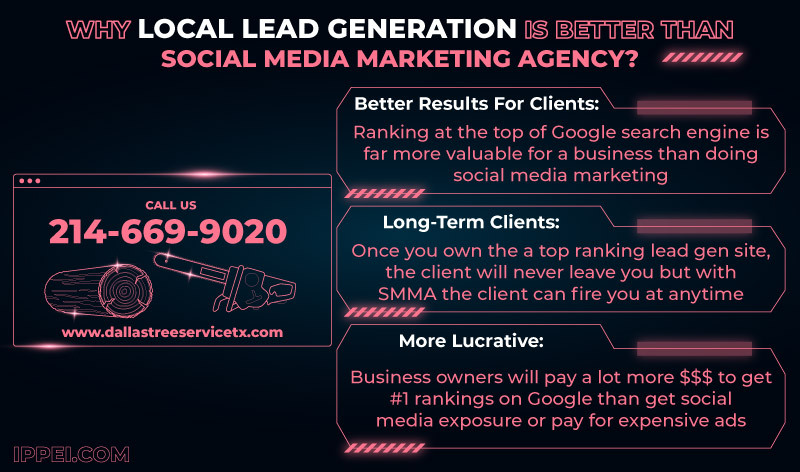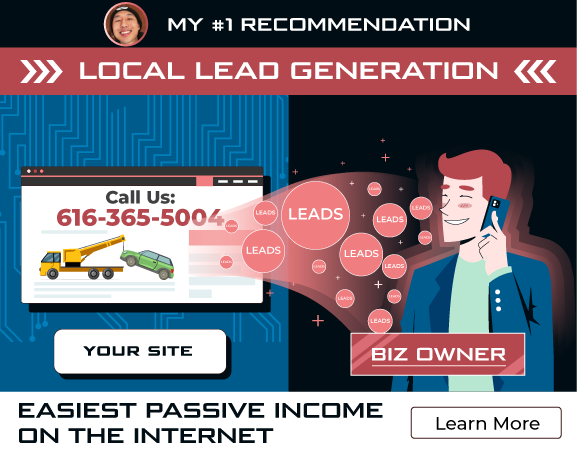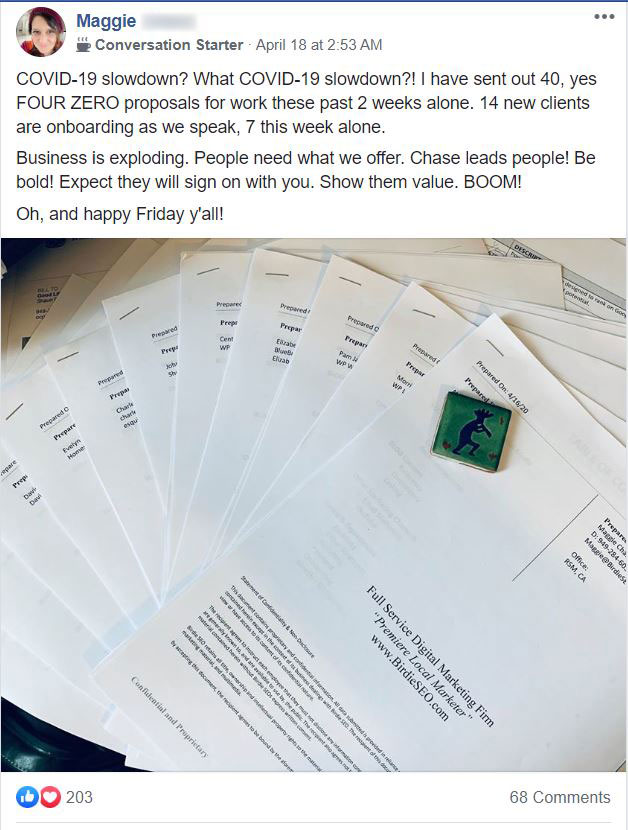
What does a digital marketing agency do? A digital marketing agency supports businesses in achieving their online marketing goals by providing digital marketing services like SEO, PPC, social media marketing, and marketing automation. Digital marketing can be complicated, especially for businesses that aren’t tech savvy. For example, approximately 93% of small businesses struggle with their social media marketing efforts, according to PR Newswire. Digital marketing agencies can provide the expertise and skill to better enable businesses to reach their customers through digital channels like Google, email, and Facebook.
A digital marketing agency is a business that provides marketing services for a fee. Digital marketing agencies typically charge clients between $1,000 and $7,500/month for digital marketing services, according to Hostinger. A good example of a digital marketing agency is NP Digital. NP Digital is a full service digital marketing company started by Neil Patel that specializes in providing digital marketing services to major corporations with over $100 million in annual revenue.
What does a digital marketing agency do?
A digital marketing agency does online marketing initiatives for companies seeking support in driving business through digital channels like Bing, Instagram, YouTube, and live chat. Digital marketing agencies can:
What services do digital marketing agencies offer?
1. Lead generation
Lead generation is a service offered by digital marketing agencies that entails finding potential customers for a brand’s offer. Marketing agencies that specialize in lead generation can use a variety of digital channels to generate interest in an offer and provide potential customers to businesses who pay for the leads. Generating business can be challenging, so many brands are willing to pay well for agencies that bring them customer leads with a good conversion rate. In fact, the mean cost paid for leads across all industries is approximately $198.44, according to Exploding Topics.
An example of lead generation is Uber. The Uber app provides freelance drivers with a steady stream of customers who need ride sharing services. As compensation, Uber takes a percentage of the driver’s earnings for providing them with the customer through their app.
2. Search engine optimization (SEO)
Search engine optimization is the process of improving a brand’s visibility in organic search results on search engines like Google, Bing, YouTube, and Yandex. Organic search through search engines is the leading source of website traffic, according to HubSpot, contributing 27% of all website traffic. Considering the importance of free search engine traffic, many businesses are willing to make SEO a major portion of their marketing budget. In fact, an SEO agency typically charges between $75 and $100/hour for SEO services, according to Ahrefs.
SEO consists of 4 main types, including:
3. Search engine marketing (SEM)
Search engine marketing is a digital marketing tactic that focuses on reaching potential customers through search engines by leveraging both organic and paid traffic channels. SEM is also often used in the context of just paid advertising through search engines as well. Neither definition is wrong, but it’s important to note that the term SEM can have different meanings. Regardless, the purpose of SEM is to improve a brand’s positioning in search engine results. Nearly 93% of all global search engine traffic comes from Google, so SEM services are usually geared towards better positioning on Google specifically. SEM services typically cost a business around $10K/month, including ad spend budget, according to WebFX.
4. Paid advertising (PPC)
Paid advertising is a digital marketing strategy where advertisers pay a fee to have their advertisements reach their target audience directly on online platforms. Paid advertising channels operate on a pay-per-click (PPC) basis, whereby advertisers bid against each other for placements and pay a fee each time their advertisement is clicked. For example, the average Google Ad on the Search Network has a cost per click between $2 and $4, according to WordStream. Some of the most popular paid advertising platforms include:
- Google Ads
- Bing Ads
- Facebook Ads
- Instagram Ads
- LinkedIn Ads
- X Ads
- Amazon Ads
- Pinterest Ads
The average small business spends between $1,000 to $10,000/month on paid advertising, according to WordStream. Marketing agencies that provide paid advertising services typically take 10% to 20% of the ad spend amount as a management fee, according to Agency Analytics. For example, if a business has an advertising budget of $10,000 and works with an advertising agency that takes a 10% PPC management fee, $9.000 of the budget goes to the actual cost of running the advertisements and $1,000 compensates the digital agency for their services.
5. Email marketing
Email marketing is a type of direct marketing that enables a business to reach their target audience directly to share product launches, promotions, and brand information. Email marketers assist brands with optimizing their revenue potential through email by carrying out tasks like:
- Copywriting emails
- Monitoring analytics
- Split testing campaigns
- Setting up automated email sequences
- Managing email lists
- Creating landing pages for email list opt-in
64% of small businesses use email marketing to reach prospective customers, according to Campaign Monitor. Email marketing services can cost anywhere from $15 to $100/hour, according to Constant Contact.
6. Social media marketing
Social media marketing leverages social media platform channels like Facebook, Instagram, X, and TikTok to drive brand awareness and sales. Over 4.9 billion people use social media globally and spend an average of 145 minutes on social media each day, according to Forbes Advisor. Therefore, social media is one of the most effective online channels for reaching audiences. Social media marketing includes tasks like:
- Content creation
- Post scheduling
- Direct messaging
- Community management
- Influencer marketing
91% of businesses use social media for marketing, according to data from Statista. Digital marketing agencies typically charge between $100 and $5,000/month for social media management services, according to WebFX.
7. Content marketing
Content marketing is an inbound marketing strategy that attracts a relevant audience and builds a brand’s authority by creating and sharing relevant content like articles, videos, images, podcasts, and other media. Content marketing is often used in coordination with other digital marketing strategies. For example, SEO and social media marketing can utilize content marketing to achieve the intended result of improving visibility through organic channels and reaching more potential customers. Approximately 70% of marketers use content marketing as part of their overall marketing strategy, according to the Content Marketing Institute. Using a content marketing agency costs between $5,000 and $20,000/month on average, according to digital marketing agency HawkSEM.
8. Digital public relations (PR)
Digital public relations is managing the public perception of a brand on digital channels. Maintaining a positive online reputation is critical for a brand because many potential customers use digital channels to research brands and the news that surrounds them. For example, the #DeleteUber campaign on Twitter in January 2017 was a viral campaign that caused hundreds of thousands of users to stop using the Uber platform, according to Business Insider. Therefore, managing a brand’s online reputation can have a major impact on its profit potential.
The goal of digital PR is to increase online mentions of a brand and generate high-quality backlinks to the brand's content, like press releases and blog posts. A reputable digital PR marketing firm can charge between $5,000 to $10,000/month, according to Forbes.
9. Website design and development
Website design and development is the process of creating websites and mobile applications. Web design involves designing graphical elements for a site’s use and mocking up how the site should look while web development is coding the website to appear as the web designer intended and adding functionality to the website. Considering that one of the primary goals of digital marketing is to get potential customers to a brand’s website, having a high-quality website that is easy to navigate is an essential component of digital marketing success. Web design costs for business websites can range between $2,000 and $75,000, according to WebFX.
10. Graphic design
Graphic design is creating visual media to communicate ideas in digital form. Graphic design is important for digital marketing because most digital marketing campaigns require graphic media to capture attention and keep audiences engaged. For example, paid advertisements, blog posts, social media posts, and YouTube thumbnails can all leverage graphical assets to entice users. As such, digital marketing agencies typically include graphic design in their marketing packages and service offerings. The average rate for graphic design is approximately $25/hour, according to Upwork.
11. Video marketing
Video marketing is using video content to spread brand awareness and promote offers online. Video marketing is used for many digital marketing aspects, including for a brand’s website, social media posts, and paid advertisements. Video watching makes up a large portion of the content consumed online, with internet users spending nearly 7 hours per week viewing videos online, according to Limelight. Professional video marketing companies can charge between $5,000 to $20,000 per minute of video, according to Business.com.
3 Types of digital marketing agencies
1. Full service digital marketing agency
A full service digital marketing agency offers a broad range of digital marketing services to provide comprehensive marketing solutions. A full service digital marketing agency is capable of executing each component of a digital marketing campaign, from coming up with the digital marketing strategy to implementing the necessary online marketing tasks to realize campaign goals. Full service digital marketing agencies are great options for businesses who want to completely outsource their marketing activities to experts.
2. Specialist digital marketing agency
A specialist digital marketing agency excels in a specific digital marketing service. For example, an SEO agency focuses primarily on offering SEO services. Specialist digital marketing agencies can establish advanced knowledge in their particular discipline to provide a high level of service for businesses seeking marketing support for a specific digital channel.
3. Digital marketing consulting agency
A digital marketing consulting agency staffs digital marketing consultants to support businesses in realizing their marketing goal. Digital marketing consultants provide advisory support as opposed to actually implementing digital marketing efforts. As such, digital marketing consulting agencies make good choices for businesses who need high level expertise to formulate effective digital marketing strategies.
What can you expect from a digital marketing agency?
You can expect to work longer hours from a digital marketing agency. According to a survey conducted on Inbound by Karl Sakas of the digital marketing agency Sakas and Company, 50% of marketing agency employees work 40 to 49/hours a week on average, while 33% reported working 50 hours or more. When working through a digital marketing agency, you can also expect to work on a greater variety of projects compared to an in-house digital marketer who focuses on marketing tasks for a single business. That means you need to be flexible and able to balance knowledge of multiple businesses and industries, depending on which clients you perform marketing tasks for.
What is the responsibility of a digital marketing agency?
The responsibility of a digital marketing agency is to support businesses in achieving their digital marketing goals while ensuring adherence to any legal requirements related to the act of marketing. The field of digital marketing is governed by various laws and regulations. As the entity claiming expertise in the field, a digital marketing agency is responsible for ensuring a brand’s marketing efforts meet these legal requirements. Some legal requirements that a digital marketing agency should be aware of are:

What is the goal of a digital marketing agency?
The goal of a digital marketing agency is to support brands in achieving their online marketing goals through their digital marketing services while earning a profit. Marketing agencies achieve this goal by staffing qualified employees, putting processes into place, and securing the right marketing technologies for their business.
How does a digital marketing agency make money?
A digital marketing agency makes money by charging clients a higher price for services than it costs the agency to deliver the services. Digital marketing agencies earn a profit by calculating how much it costs to deliver a service and then adding a markup. Digital marketing agencies can charge clients by:
- Project - Charging clients by each individual product completed.
- Package - Packaging relevant services together and charging a predefined package price.
- Retainer - Charging a set fee at the beginning of each month before services are actually accrued to ensure a marketing agency maintains enough capacity for a brand’s marketing needs.
- Hour - Charging an hourly rate for marketing services.
Can you make money with a digital marketing agency?
Yes, you can make money with a digital marketing agency. Digital marketing agency owners make $97K/year on average, according to data from Glassdoor.
How profitable is a digital marketing agency?
A digital marketing agency can be very profitable. Established digital marketing agencies can make 50% to 60% profit, while newer agencies can make between 20% to 30% profit margin, according to digital agency accelerator OMG Center. The type of profit margin you can expect from a digital marketing agency depends on many factors, including the type of agency it is.
How to start a digital marketing agency?
- 1Decide on an agency structure (Ex: Full service agency)
- 2Pick a niche
- 3Choose a payment method (Ex: Monthly retainer)
- 4Advertise services to find clients
- 5Deliver results
These are the simple steps on how to start a digital marketing agency.
How to package and sell digital marketing services?
- Identify your core services
- Choose a primary business niche to target
- Bundle relevant services together to provide increased value
- Set transparent pricing
- Outline clear deliverables
- Offer the option for customization
- Formulate a marketing strategy
- Contact and qualify leads
- Pitch qualified leads on digital marketing services
- Respond to objections
- Close clients
This is how to package and sell digital marketing services for a digital marketing agency.
Conclusion: Is a digital marketing agency a good idea?
A digital marketing agency is a good idea because there is immense opportunity and growth within the field of digital marketing. The global digital marketing industry is valued at $531 billion as of 2022 and it’s expected to reach $1.5 trillion by 2030, according to Yahoo Finance. Even so, it’s important to pick the right digital marketing agency structure if you want a good experience. Some digital marketing agency models and services can require longer hours and less income potential than other services. For the optimal combination of work-life balance and income potential, the local lead generation agency model is best.
With a local lead generation agency, you can set up websites for clients that you own and generate passive income. Local lead generation works by targeting services in specific geographic locations by creating and ranking websites on Google. These websites attract potential customers that you can sell to local service businesses for anywhere between $500 and $3,000/month. Once you get a local lead generation website to rank on Google, you can affordably automate most of the website maintenance through tools and freelancers. Local businesses that you partner with are likely to stick with you for the long term because you provide them with a reliable source of customers through organic search on Google. As such, local lead generation websites can make passive income. Earning passive income leaves you with more time to scale your business with more local lead generation websites to create a passive income machine.

Furthermore, the fact that you own the websites is superior to other digital marketing agency models because it protects your business. For example, if you run an agency that offers SEO services, your clients can cut you at any time because they own their own website and the content on it. On the other hand, a local lead generation agency owns all of its website assets, so a client can’t fire a local lead generation agency without losing their valuable leads. If a client does decide to end their relationship with your local lead generation services, you can just find another client to pay you for the leads. If you want to learn how to start your own local lead generation agency and start making passive income online, this lead gen program will teach you how.



